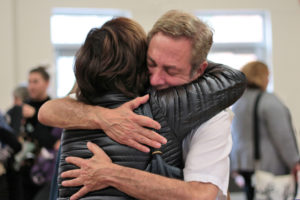What to Say to Grieving Friends & Family.

In tender times, how do we find the right words to say to our loved ones who are grieving? How might we advocate for ourselves in times of our own deep grief? In today’s episode, David talks about the struggle we all face when navigating a fog of desolation and disbelief. He shares words that can extend care, comfort and community. And words that can isolate, or even wound. We also hear personal stories from people who have experienced the best and worst of each. If you’re unsure or scared of saying the wrong thing to someone, or feel alone and misunderstood in your grief, this episode is for you.

David Kessler is one of the world’s foremost experts on grief and loss. His experience with thousands of people on the edge of life and death has taught him the secrets to living a happy and fulfilled life, even after life’s tragedies. He is the author of six books, including his latest bestselling book, Finding Meaning: The Sixth Stage of Grief. He co-authored two books with Elisabeth Kubler-Ross, Life Lessons and On Grief and Grieving, updating her 5 stages for grief. He also co-wrote, You Can Heal Your Heart with Louise Hay. He also wrote Visions Trips and Crowded Rooms. His first book, The Needs of The Dying received praise from Saint (Mother) Teresa.
David’s personal experience as a child witnessing a mass shooting while his mother was dying in a hospital helped him begin his journey. For most of his life, David has taught physicians, nurses, counselors, police, and first responders about the end of life, trauma, and grief. He facilitates talks, workshops, and retreats for those experiencing grief. However, despite his vast knowledge on grief, his life was turned upside down by the sudden death of his twenty-one-year-old son. It inspired him to write his latest and most personal book, Finding Meaning.
He is Chief Empathy Officer for the Empathy.com app. David’s volunteer work includes being a founding member of Project Angel Food, a well-known and loved non-profit organization. He currently serves on the board of The Farrah Fawcett Foundation which provides cancer research, patient assistance, and prevention efforts. He also serves as Specialist Reserve for the Los Angeles Police as well as having served on the Red Cross’s disaster services team. He is the founder of Grief.com which has over five million visits yearly from 167 countries.
In this episode, David Kessler shares what to say and what not to say to someone in grief.
The context of the comments we make really matters. We can’t assume that anyone else has the same belief system that we do or that they experience things the same way.
When someone we know is in grief, we may want to help them, cheer them up, or try to make things better in grief. We want to say the right thing. But it can be so awkward. In this episode, David shares what to say, what not to say, and what you can do to share the grief journey with people you care about.
The Worst Things to Say to Someone in Grief
- They want to fix the loss
- They are directive in nature
- They rationalize or try to explain the loss
- They may be judgmental
- May minimize the loss
- Put a timeline on loss
The Best Things to Say to Someone in Grief
- Supportive, but not trying to fix it
- About feelings
- Not telling anyone what to do
- Not asking for someone to change their feelings
- Recognize loss
- Not time-limited
- Just listen
Grief is a lonely and painful road and just knowing there is someone there with you makes all the difference in the world.
We would love to hear from you. Share the best and worst things that people have said to you in grief in the comments below.
To receive a free video from David about the best and worst things to do for someone in grief click here. https://www.davidkesslertraining.com/worst-and-best
www.tenderheartssupport.com - David's online grief support group, Tender Hearts
www.aboutgrief.com - Understanding loss and grief
www.lossofaparent.com - Death of a parent
www.parentforever.com - Death of a child and sibling
www.griefsuicide.com - Death of a loved one by suicide
988lifeline.org - 988 Suicide & Crisis Lifeline
nami.org - National Alliance of Mental Illness
afsp.org - American Foundation of Suicide Prevention
adultchildren.org - Adult Children of Alcoholics® & Dysfunctional Families
al-anon.org - Al-Anon Family Groups
amzn.to/31AZCPv - Finding Meaning: The Sixth Stage of Grief
actapublications.com/tear-soup - Tear Soup: A Recipe of Healing After Loss
www.elf-help.com/grief_therapy_124048.htm - Grief Therapy, Elf Help Books
Let others know if they hurt your feelings
When something doesn’t sit right with you you can say, “Ouch!” Or “That’s not helpful.” I know as a person in grief, you shouldn’t have to be the teacher. But sometimes we are. You don’t have to respond in the moment.
Consider forgiveness
You can forgive the person but you don’t need to forgive the action. We all say the wrong things sometimes. Can you hold onto the friendship without forgiving the action? You can let them know how their words stung and also how much you value the relationship.
Make a direct ask
Ask for what you need. So often others don’t know what would be helpful to you. You might need to let others know exactly what they can do to support you.
Understand the Rule of 3
If you’re a friend or family of someone in grief. Call them 3 days after the funeral, three weeks after the funeral, and 3 months after the funeral. Call without expectation. Reach out to people and don’t be afraid to mention their loved one’s name.
It’s never too late to apologize
If you’ve said something that wasn’t helpful, give them a call and let them know that you’re sorry and that you want to understand how to support them.
Licensed Professional Counselors – Get listed on Grief.com

